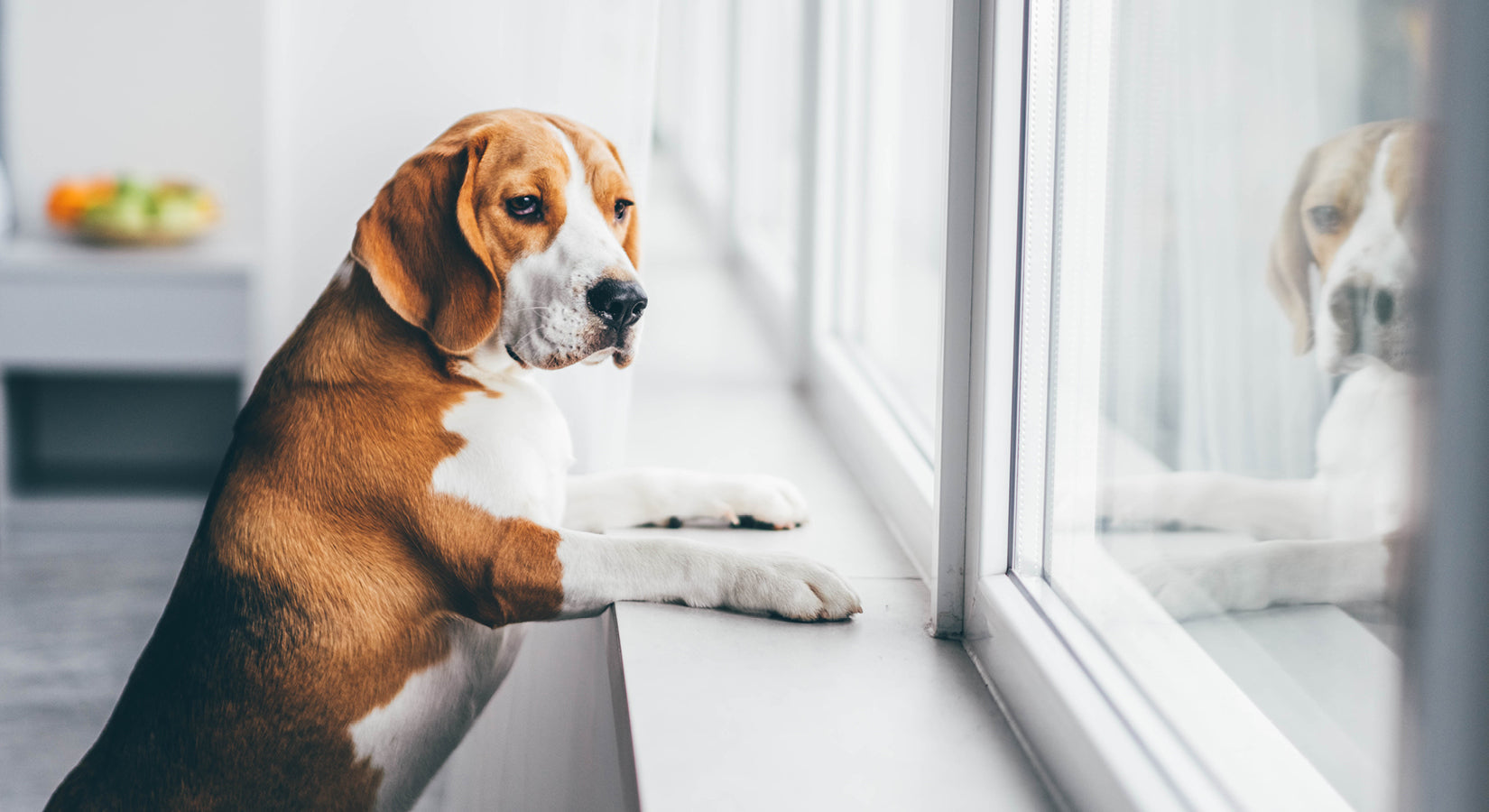For many of our pets, having us spend *a lot* more time at home with them over the last year has been a dream come true.
Whether they’ve become your furlough friend, home-office buddy or home-schooling assistant, we’re definitely going to miss them when we return to 9-5 office life – from their motivational cuddles to their Zoom-call cameos (but perhaps not their persistent attempts to take an afternoon nap on our keyboards!).

But this transition will be even harder for our four-legged friends, and they will therefore need time to adjust to the idea of us going back to the office – especially if you got them during lockdown (after all, you working from home is all they’ve ever known).
To help, we’ve put together some advice to help your furry friend adjust to life after lockdown. Please note, the below tips are more tailored to dogs – as they are more likely to suffer separation anxiety – but we’ve also included some useful advice for caring for your cats later on in the blog.
Preparation is key
Going back to full-time office life after almost 15 months will be strange for us humans, but it’s an even bigger deal for our pets. While only time will tell what the impact will be, there are plenty of warning signs to suggest that, for some pets, it won’t be a smooth transition unless it’s well-prepared for:
- 8 out of 10 dogs experience stress when left alone, but 50% will show no signs that they’re struggling (RSPCA)
- There have been increased reports of clinginess and attention-seeking behaviours among dogs (Dogs Trust)
- 50% of dog owners’ biggest worry is their pet suffering from separation anxiety post lockdown (Petplan).
So, if your return to work is looking likely to happen soon, now’s the time to take action to limit any stress caused by this major change to your routine.
8 tips for tackling your dog’s separation anxiety
- Spot the warning signs
We’ve all had a lot of adjusting to do over the last year or so, and during these challenging times, we’ve been encouraged to look out for our loved ones for signs they’re not coping. The same applies to our furry friends.
After all, dogs love to be part of a pack, and can feel anxious if the pack ‘disappears’ unexpectedly. Each dog will be affected differently by lockdown ending, but it’s important to know the signs of separation anxiety. Think back to the times you have left the house recently – how did your pooch react? Here are a few of the more common signs of separation anxiety to look out for:
- Whining, barking or begging for attention
- A change in appetite or toilet habits
- Acting out or damaging objects
- Excessive grooming.


- Start encouraging them to spend time by themselves
One reason we love our canine companions so much is their excitement about being part of our daily activities; however, if they’ve been a part of literally all of our pastimes over the last year, it’s a good idea to get them used to spending more time in their own company. This isn’t just about you leaving the house without them, but also spending less time together in the house.
You can slowly build up to this – you could start leaving your dog in a different room on their own for short periods while you’re working. Make sure you leave them with toys and even the radio on for background noise, while you’re out of sight (and reach!). And remember to reward them for good behaviour shown during these times.


- Leaving the house – practise makes perfect
Once your dog has become used to spending less time with you in the house, you can try leaving the house without them for short periods (you might already be doing this now that the shops and pubs have reopened). Make sure they have safe toys and chews to keep them occupied and a comfy, familiar place to rest. Gradually increase the length of time that you’re out, so that they realise it’s not such a frightening experience and you’ll always come back.


- Keep it low-key
Try not to make it a big deal when you leave or come back to the house, as it will help your dog feel more relaxed about it. What’s more – dogs can pick up departure cues like putting on your shoes or grabbing your handbag or keys, and this can make them anxious. If you’re noticing this, why not use these ‘cues’ on a regular basis without actually going out? This will stop your canine companion associating specific actions with you going out.


- Get into your post-lockdown routine now
If you’ve been working at home or furloughed, chances are that you’ve been keeping slightly different hours to normal. But if you’re set to head back to the office soon, start getting your dog used to a daily routine that reflects post-lockdown life – including getting up/bedtime, walkies, play time, toilet breaks and mealtimes.

- Sign up some playmates
The RSPCA recommends that you don’t leave a dog unattended for more than four hours, so you need to think about things you can do so they won’t be left completely alone when you’re at work. For example:
- Ask your boss if you can bring your dog into the office some afternoons (you never know!)
- Have your lunch break at home if you can – giving your dog the opportunity to go out in the garden, relieve themselves and, of course, have some cuddles
- Ask a neighbour, friend or family member to pop in during the day
- Start using a dog-walking or ‘doggy day care’ service.
For the latter, it’s a good idea to get the ball rolling now, so your pooch gets used to their new walk buddy.

- Get social
And talking of getting used to new people – if you got your puppy during lockdown, chances are they won’t have had the chance to meet lots of new dogs or people yet. But socialisation is a vital part of their development and confidence-building, which is especially important if you’re soon going to be spending less time with them. Puppy training classes or dog-walking services are a great way for puppies to meet other pups and people.
- Don’t punish separation-related behaviour
Most importantly, don’t discipline your dog for anxious behaviour, as this will only worsen the situation. Remember that separation anxiety can be quite common – pets love a routine, and can find change upsetting. Again, this will especially be the case for newly adopted pups, as they won’t have been left on their own for extended periods.

It’s also important to note that in cases of severe separation anxiety, you should seek advice from your vet – if needed, they can refer you to a clinical animal behaviourist.
What about cats?
Our feline friends are naturally more independent, but they can still experience separation anxiety or unease about a change in routine. As with dogs, it’s a good idea to start getting your cat used to you being out of the house more, and re-establish your daily routine – particularly those all-important feeding times! Make sure you provide them with plenty of stimulation while you’re out, such as scratch posts and toys, as well as creature comforts and a safe place for them to relax in.


Adjusting to life after lockdown
Our pets are cherished members of the family, and the joy they bring to our lives has been the perfect remedy to the challenges of the pandemic. But, if we’re honest, they’ve probably been a little spoiled of late – having us at their beck and call throughout lockdowns 1, 2 and 3.
As we’ve seen, when helping your pet adjust to the ‘new normal’, it’s all about taking baby steps. Starting these now might prevent extra stress when you do return to the office, and will benefit you both in the long-run – helping your pet become more adaptable and confident.
Here at Closer Pets, we understand that the transition of going back to the office might be daunting for owners and pets alike, and our products are here to lend a helping paw. Our automatic pet feeders can help you get back into a set mealtime routine, and can actually improve your relationship with your pets, by disassociating you with food (and therefore reducing anxiety if you’re out). What’s more, our smart cat flaps and dog doors can give your feline friend or canine companion the independence to come and go during the day while you’re at work. View our full product range here.


Extra reading
The RSPCA’s #DogKind campaign is a lovely way of helping you better understand your dog’s behaviour and teach them to feel happier when left alone – view it here.

